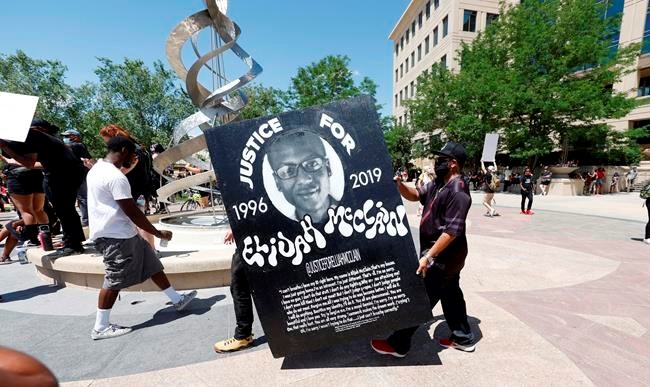DENVER — A police department in suburban Denver faced a new set of investigations and legal problems Tuesday as scrutiny mounts over the death last year of Elijah McClain, a 23-year-old Black man put into a chokehold by officers, and other run-ins with people of
McClain's parents sued the Aurora Police Department and paramedics who injected their son with a sedative, saying they were seeking both accountability for the loss of a “beautiful soul” and to send a message that “racism and brutality have no place in American law enforcement.”
Soon afterward, the Colorado attorney general announced a civil rights investigation into the department, the first under a new police reform law passed after George Floyd’s death in Minneapolis set off global protests. The office of Attorney General Phil Weiser said it's been looking into whether Aurora officers have been depriving people of their
They are among several investigations into Aurora police, which have drawn outrage amid a national reckoning over racial injustice and police brutality.
Also Tuesday, the city manager and new police chief said an outside firm would review the department, including its policies and practices on use of force and discriminatory policing. The City Council already has begun an investigation of Aurora's policies on using force and ketamine, the sedative injected into McClain.
“We embrace this opportunity for change and are committed to evolve for the betterment of our profession, our community and the residents we serve," Police Chief Vanessa Wilson, who was named to the post last week, said in a statement.
The city declined to comment on the lawsuit from Sheneen McClain and Lawayne Mosley, who accused police of a longstanding pattern of racism and brutality.
They allege that their son was unlawfully stopped on the street and that officers later sought to justify their aggressive treatment of McClain by filing an assault charge and making a notation in a police report suggesting he was connected with a gang.
McClain’s parents said their son, a massage therapist, was a creative and peaceful man who played his violin for cats at shelters to ease their loneliness and wouldn't swat a fly.
On Aug. 24, 2019, police stopped McClain as he walked wearing a ski mask and headphones after getting a 911 call reporting him as “sketchy.” His family said he wore the mask because he had a blood condition that caused him to get cold easily.
Police body-camera video shows an officer getting out of his car, approaching McClain and saying, “Stop right there. Stop. Stop. ... I have a right to stop you because you’re being suspicious.”
In the video, the officer turns around McClain, who seems startled, and repeats, “Stop tensing up.” As McClain tries to escape his grip, the officer says, “Relax, or I’m going to have to change this situation.”
Other officers join to restrain McClain, and he begs them to let go, saying, “You guys started to arrest me, and I was stopping my music to listen.”
Police put him in a chokehold, and paramedics gave him 500 milligrams of ketamine to calm him down, which the lawsuit says was too much for someone weighing about 140 pounds (65 kilograms).
Police say McClain refused to stop walking and fought back when officers tried to take him into custody and that they thought he was trying to take an officer's gun, which the lawsuit disputes.
McClain suffered cardiac arrest and was later taken off life support. A prosecutor said last year that there wasn't enough evidence to charge the officers, which the state attorney general is now reviewing.
The lawsuit says two officers reported that all three of them put their weight on McClain after a chokehold. One officer estimated the collective weight to be over 700 pounds (320 kilograms).
The lawsuit comes just over a week after police faced outrage for putting four Black girls on the ground and handcuffing two of them while investigating a suspected stolen car. It was later found not to be stolen.
Wilson, who was interim chief, took the permanent job last week and said she’s committed to rebuilding trust and wants to empower police to think about whether they're acting on biases.
She's called McClain's death tragic and said she was “angry and disgusted” by the girls’ treatment. She's taken some steps to hold officers accountable.
After the girls were handcuffed, she requested an internal investigation. A prosecutor is also reviewing the officers' actions.
As interim chief, she told police in response to McClain's death that they no longer had to contact a person reported as suspicious if they weren't committing a crime.
When photos surfaced of police reenacting the chokehold used on McClain, she moved quickly to fire three officers, including one involved in stopping McClain.
____
Nieberg is a corps member for the Associated Press/Report for America Statehouse News Initiative. AP reporter Thomas Peipert contributed to this report.
Colleen Slevin And Patty Nieberg, The Associated Press



